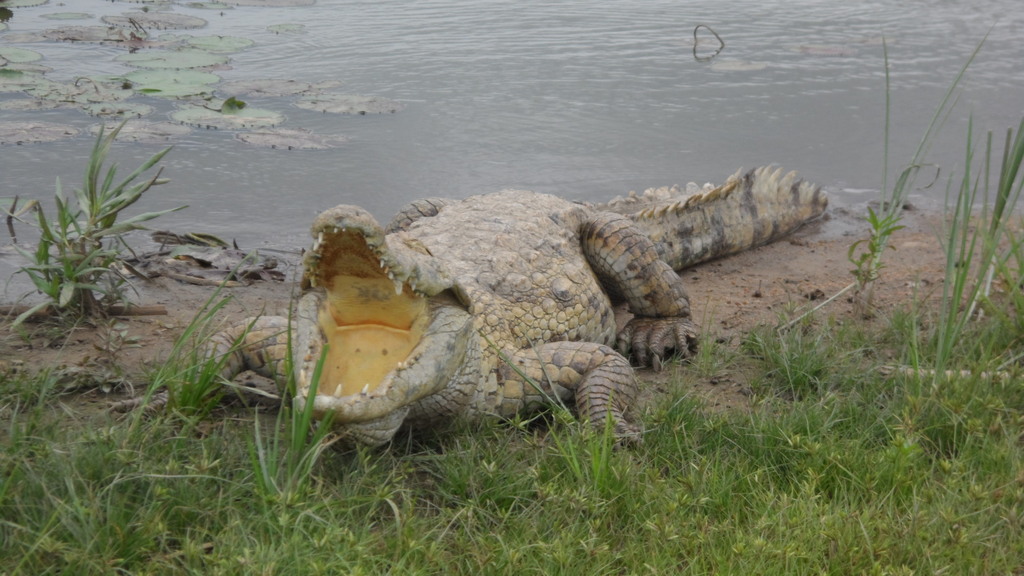Paga Crocodile Pond: Ghana’s Sacred Sanctuary Where Crocodiles Pose for Photos
If you're planning a trip to northern Ghana, Paga Crocodile Pond is a must-see destination that blends cultural heritage, wildlife encounters, and unforgettable photo opportunities. Located near the Ghana–Burkina Faso border in the Upper East Region, this sacred pond is home to some of the world’s most surprisingly friendly crocodiles—making it one of Ghana’s most unique tourist attractions.
🇬🇭 Ghana3d.com Gateway Experience 360
Find your roots and rise — (Or continue reading below!) Ghana3d.com Gateway Experience 360 is your ultimate guide to cultural, historic, and soul-stirring adventures. Whether you're returning to your ancestral land or exploring Ghana for the first time, we offer curated journeys that connect you deeply to the spirit of West Africa. From powerful walks through Cape Coast & Elmina slave castles to the vibrant rhythms of Accra’s nightlife. From sacred village ceremonies to awe-inspiring natural beauty — your journey starts here.
- ✔ Instant Confirmation
- ✔ Free Cancellation
-
✔ Best Price Guarantee
You'll receive a full refund if you cancel at least 24 hours in advance of most experiences.
What Is Paga Crocodile Pond?
Paga Crocodile Pond is a revered site in the town of Paga, approximately 44 kilometers from Bolgatanga. The pond is inhabited by West African crocodiles, some believed to be over 90 years old. Unlike their wild counterparts, these crocodiles are known for their calm demeanor and coexist peacefully with humans—a phenomenon rooted in centuries-old local beliefs.
According to legend, a crocodile once saved a dying man at the pond, prompting the community to declare the site sacred. Another tale speaks of a man escaping a lion by bargaining with the crocodiles, promising his descendants would honor them. Today, the reptiles are considered embodiments of ancestral spirits, and harming them is strictly forbidden.
📸 What to Expect When You Visit
Visitors to Paga Crocodile Pond are often stunned by how close they can get to these majestic creatures. With the help of local custodians, crocodiles are gently enticed from the water—often with offerings of live fowl—and guided onto land. Tourists can then pose beside the crocodiles, touch their backs, and capture once-in-a-lifetime photos.
Despite their size and strength, the crocodiles remain calm during these interactions, a behavior attributed to generations of respectful human contact. The experience is safe when guided by trained handlers, and many visitors leave with incredible stories and snapshots to share.
🛕 Cultural Significance
Beyond the thrill of meeting crocodiles, the pond holds deep spiritual and cultural importance. Locals believe the crocodiles are sacred guardians, and the pond is often referred to as the Chief’s Pond. It plays a role in traditional ceremonies and is a symbol of harmony between nature and community.
This reverence ensures the crocodiles are well cared for, with tourism helping fund their upkeep. The site is also a model of eco-tourism, where wildlife conservation and cultural preservation go hand in hand.
🗺️ How to Get There
- Location: Paga, Upper East Region, Ghana
- Nearest City: Bolgatanga (44 km away)
- Transport: Accessible by road from Bolgatanga or Navrongo; local buses and taxis available
💡 Travel Tips
- Best Time to Visit: Dry season (November to March) for easier travel and clearer skies
- Entry Fee: Modest fee for guided interaction (varies by season)
- Safety: Always follow the instructions of custodians; do not approach crocodiles alone
- Photography: Bring a wide-angle lens or smartphone with good zoom—these shots are worth framing
🌍 Why Paga Crocodile Pond Should Be on Your Bucket List
Whether you're a wildlife enthusiast, cultural explorer, or just looking for a unique travel experience, Paga Crocodile Pond offers a rare blend of nature, legend, and adventure. It’s not every day you get to sit beside a crocodile and live to tell the tale—with a photo to prove it.
Add Paga Crocodile Pond to your Ghana itinerary and discover the magic of a place where ancient beliefs and modern tourism meet in harmony.

Paga Crocodile, at Paga Crocodile PondsGhana (c) Remo Kurka
🛣️ How to Get There from Accra
✈️ By Air (Fastest Option):
Nearest airport: Tamale International Airport (TML)
You can fly from Accra to Tamale in about 1 hour with airlines like Africa World Airlines or PassionAir.
From Tamale, it’s about a 3.5-hour drive to Bolgatanga via public transport or private car.
🚌 By Road:
The road trip from Accra to Bolgatanga is about 820 km and can take 13–15 hours by bus.
Several long-distance bus services, including STC, VVIP, and Metro Mass Transit, operate routes to Bolga, often via Kumasi, Tamale, or Techiman.
🚗 Tip: If you’re up for an adventure, a road trip through northern Ghana is incredibly scenic and rewarding, with plenty of cultural stops along the way.

Click on the Paga Croc, and visit Paga Crocs website!
🧭 See also Bolgatanga
🎨 1. Bolgatanga Craft Market
The heart of Bolga's cultural identity! This market is world-famous for its Bolga baskets, made from elephant grass and woven by skilled artisans. You’ll also find handmade smocks (fugu), leather goods, hats, and jewelry — all at affordable prices and perfect for souvenirs.
🏞️ 2. Tongo Hills & Tengzug Shrine (Approx. 15 km south of Bolga)
A spiritual and scenic site, the Tengzug Shrine is located in the rocky Tongo Hills. It’s a sacred place where locals still practice traditional religion. Expect a short hike, sweeping views, and insightful stories — but note that visitors may need to remove shirts (per custom) and ask permission before taking photos.
🏰 3. Paga Crocodile Pond (About 40 km north)
This is one of Ghana’s most famous and unusual attractions — a sacred crocodile pond where the crocodiles live in harmony with locals. For a small fee, you can touch, sit on, or even hold the tail of a crocodile (under guide supervision). It’s said that harming them brings misfortune, which is why they’re treated with great respect.
🧱 4. Navrongo Cathedral
Located just outside Bolgatanga, this is one of the oldest Catholic churches in Ghana, built in 1906 using mud architecture. Known as the “Mud Cathedral,” it features traditional frescoes and wall paintings inside — blending Christian themes with local art.
🌿 5. Zuarungu & Sirigu Villages
Explore traditional compounds, mural-decorated homes, and pottery centers. Sirigu is particularly famous for its female-led artisan groups, and visitors can take part in painting, pottery, or basket weaving workshops.
🍲 Where to Eat in Bolgatanga
🥘 Tap Hotel Restaurant
One of the top spots for visitors, serving a good mix of local and continental dishes. Their TZ (Tuo Zaafi) and goat soup are local favorites.
🍛 Moonlight Restaurant
Great for local dishes and casual vibes. Try traditional northern Ghanaian dishes like rice balls with groundnut soup or waakye.
☕ Golden Horse Hotel Restaurant
Ideal for breakfast or dinner, offering a clean, comfortable setting with both local and international options.
🌽 Local Chop Bars
Don’t miss out on trying meals from roadside vendors and market food stalls. Meals are hearty, spicy, and often made fresh with ingredients grown nearby.
🏨 Where to Stay
Tap Hotel – One of the best-rated accommodations in Bolga, with A/C rooms, Wi-Fi, and a restaurant.
Akayet Hotel – A more upscale option with conference facilities and good service.
Blue Sky Hotel – Comfortable and budget-friendly, with a nice view of town.
Guest Houses – Affordable and friendly; options like Catholic Guest House are popular with visitors on a budget.
🎉 Festivals & Culture
🎊 Feok Festival (Sandema, nearby town)
Held by the Builsa people, this festival celebrates victory over slave raiders in the 19th century. Expect war dances, traditional dress, and drumming — it’s a deeply cultural experience worth planning your trip around (usually held in December).
See also traditional names of the Frafra people of Upper East region, Ghana